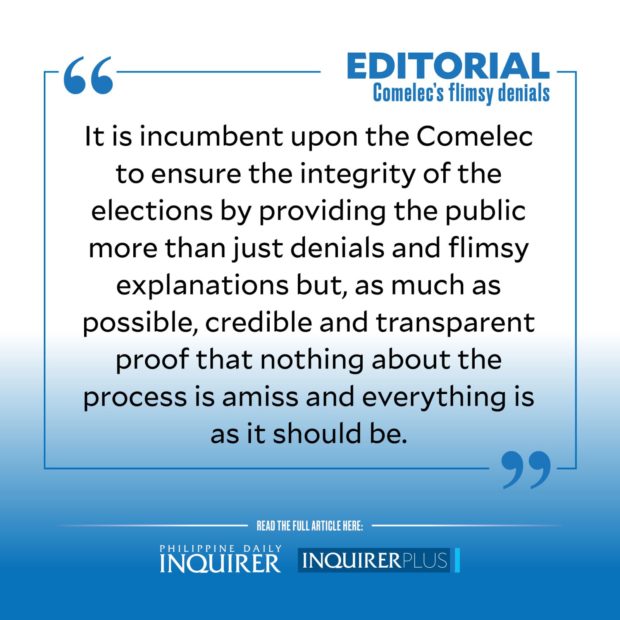Comelec’s flimsy denials
The regular conduct of free and fair elections is a key pillar of democracy.
Any electoral process that is conducted under a cloud of doubt, especially at the presidential level, is fertile ground for doubt that can and — especially in the Philippines — will be exploited to undermine the proper functioning of any administration.
Article continues after this advertisementThus, ensuring that everything about this exercise is transparent is crucial to the proper functioning of the nation.
Unfortunately, the conduct of the Commission on Elections (Comelec) in recent weeks has been less than ideal.
It started last January with the Manila Bulletin story about the alleged hacking of Comelec’s servers, which allegedly compromised key voters’ data, as well as other information relating to the technical aspects of the automated elections.
Article continues after this advertisementThis was immediately denied by the poll body, and that was that. Or so it seemed.
Last week, Sen. Imee Marcos and Senate President Vicente Sotto III revealed a security breach in the operations of Smartmatic, the company that has been providing electronic voting services and equipment to the Philippines since 2010.
The allegation, as revealed to a select group of lawmakers in a closed-door session to tackle issues related to the Comelec, was that an employee of Smartmatic made his company laptop available to an external party, which downloaded its sensitive contents.
Both the Comelec and Smartmatic were quick to issue denials that the alleged breach would affect the integrity of the upcoming elections, and that was that. Or so it seemed.
But almost at the same time, reports emerged that representatives of various political parties and candidates were denied access to the premises of the National Printing Office where the official ballots for the polls were being produced.
Having representatives of key candidates examine official ballots, on a sample basis of course, and to be present during their printing is guaranteed by law, one of the measures put in place to help shore up confidence in a system that is always beset with allegations of cheating from losing candidates (some with basis, some without).
The Comelec’s flimsy explanation that candidates’ representatives were barred from the printer’s premises due to health protocols holds no water as the metropolis has been under the least restrictive alert level with the fall in COVID-19 cases.
It was initially announced that over 5.2 million ballots of the estimated 50 million that were printed since late January were declared “defective,” and the Comelec said these would be shredded. Later, new Comelec Commissioner George Garcia said that the defective ballots were “reverified” on the same day, and more than 2 million ballots were found to be “good ballots” after all.
Given the frequency at which issues surrounding the poll body’s conduct are surfacing—and, as is common in the Philippines, more are bound to surface as Election Day nears—it behooves the Comelec to do more than the customary denial of one issue after another. The Comelec must do more than to explain away issue after issue, regardless of the quality of the explanations.
The May 9, 2022 elections would be the most important in the country’s recent history given the many challenges of the past six years, including the devastating effects of the COVID-19 pandemic. It is incumbent upon the Comelec to ensure the integrity of the elections by providing the public more than just denials and flimsy explanations but, as much as possible, credible and transparent proof that nothing about the process is amiss and everything is as it should be.
This is especially important given allegations in recent months about potential conflicts of interests among the old and new commissioners appointed to lead the poll body, and the controversy over the delay in the release of a ruling on disqualification cases against the presidential candidate leading in the surveys. That the pending disqualification cases have not been resolved by the Comelec so close to election day is another issue putting into question the independence of the members of the poll body.
(It also doesn’t help that, Senator Marcos—her revelation about the allegedly compromised Smartmatic data notwithstanding—chairs the upper chamber’s committee on electoral reforms, while her brother Ferdinand Marcos Jr. is running for the highest office in the land. She should recuse herself from this role for the time being, if only to add to the credibility of the mandate her brother may receive if he wins the elections.)
With only a little over six weeks until the elections, valuable time has already been lost. But it is not too late for the Comelec to shift its stance from one of denial and stonewalling to openness and transparency. The Comelec should support the National Bureau of Investigation to get to the bottom of the persistent reports of hacking.
Nagging feelings of misconduct or suspicion that not everything is aboveboard will help no winning candidate after the elections. If this is allowed to persist, democracy loses. And all Filipinos lose.

















